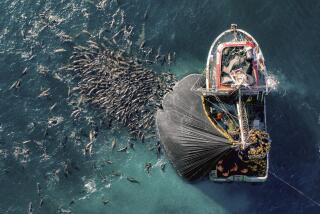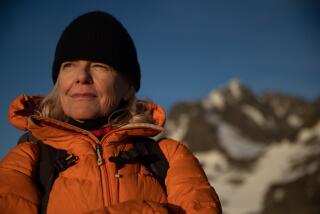It’s like Cannes for critters
- Share via
Bristol, England
Breakfast on the first day at Wildscreen begins with the creepie-crawlies, scorpions and centipedes, a discussion of the mating habits of spiders, with a filmmaker from Spain, who was pitching a project she called “Deadly Love.”
“The little male wolf spiders of Lapland drum their abdomens on the newly fallen birch leaves so loudly they can be heard for 50 yards,” she said, with excited Castillian precision.
Next on the agenda was Alastair Fothergill, producer of “Blue Planet,” the wildly successful oceans series that has put nature back on the map for us Americans, who know, if we know nothing else, that if it’s on DVD, it must be real.
I politely pulled Fothergill out of a screening of “The Deep,” as lush and stunning images of rare sea creatures floated across the screen, set against the Emmy Award-winning music of composer George Fenton.
This is the 11th biennial Wildscreen Festival, “the world’s largest and most prestigious” -- the publicists proclaim -- “festival of natural history film, television and new media.” Some 700 filmmakers from more than 30 countries have submitted 350 entries vying for 17 Panda Awards, the Green Oscars of an earnest and increasingly lucrative cable and digital world.
The weeklong Wildscreen, which concludes today, is held in Bristol, a tidal city two hours southwest of London, the place where John Cabot set sail for the New World, once the center of mercantile Britain’s slave trade -- I write this from a hotel in sight of “Black Boys Hill” and fronting “White Ladies Road” -- because Grenada Wild, the BBC’s Natural History Unit, the production house that helped to create “Chicken Run” and other film-tech businesses, are all headquartered here along with one of the great narrative voices, that of Sir David Attenborough.
It’s tempting to paraphrase some lyrics from a favorite alternative band -- “You and me, baby, are only just mammals/So come on, let’s do it, let’s do it, like they do it/On the Discovery Channel.”
But Wildscreen is not Sundance. And it’s certainly not Cannes. No drama queens, sullen hunks; only a handful of suits. These people are like the smartest kids you went to high school with, now living what the rest of us may only fantasize, filming “Secrets of a Tigress: Her Sons and Her Lovers,” while the shots from the poachers are caught on the boom mike, and you run -- intelligently, with measured step, probably with a clipped British accent -- to the camera boat.
“Americans desire a quality experience in their living rooms,” says Fothergill, who, at a trim 42, is director of development for the BBC’s Natural History Unit, “and most of the telly they’re getting is cheap. You’re not going to buy a DVD of reality TV. I mean, why bother?”
“Blue Planet,” which cost $12 million to make, is currently the top-selling nature DVD in the world, and the series gave the Discovery Channel, which has a strategic partnership with the BBC, its highest ratings. Interestingly, at the 2000 Wildscreen, the general consensus held that high-budget gorgeous “blue-chip” documentaries were dead in the water, precipitously replaced by “presenter-driven” shows such as Steve Irwin’s “Crocodile Hunter.”
The patron saint of Wildscreen 2002 was E.O. Wilson, the comparative zoologist from Harvard, who wrote “On Human Nature” and “The Ants,” both Pulitzer Prize winners, as well as “The Diversity of Life” and the current “Future of Life.” At Wildscreen the gently erudite Southerner, more understated in his humor than even the Bristolians, provided closure for the gathering.
He asked the several thousand nature-film fans assembled in the chapel of the University of Bristol if any had been raised, like him, a Southern Baptist. There were no hands. “Let’s just say,” said professor Wilson, “that for the writers -- the prophets -- of the Abrahaimic religions, ecology was not even on their screens.” He spoke of the “Paleolithic obstinacy” of our species in rectifying the damage it has done to the Earth, but said that he was optimistic.
Then he made a plea for the little creatures, and the 600 helpful bacteria species in our human mouths, and the 10 billion useful organisms living in a single handful of good soil. “Don’t call them bugs,” he added, in reference to one Panda-winning children’s entry. “They are insects.”
More to Read
Only good movies
Get the Indie Focus newsletter, Mark Olsen's weekly guide to the world of cinema.
You may occasionally receive promotional content from the Los Angeles Times.










